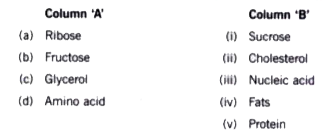TEST YOUR PROGRESS (SHORT/LONG ANSWER TYPE QUESTIONS) from S CHAND BIOLOGY (ENGLISH) BIOMOLECULES for Class 11
| Class 11 | BIOLOGY |
| Chapter | BIOMOLECULES |
| S CHAND BIOLOGY (ENGLISH) | TEST YOUR PROGRESS (SHORT/LONG ANSWER TYPE QUESTIONS) |
| Medium | English |
| Academic Year | 2023-2024 |
Question 59
Below freezing and above boiling, cells are unable to function. However, cells in most organisms are still limited from functioning throughout this full range of liquid temperatures. At the molecular level in different organisms, cells' ability to vary in their tolerance to temperature, etc., is most closely related to variation in View SolutionQuestion 358
A camel stores fat in the hump primarily as a water source rather than as an energy source.
(a) By what metabolic process would water be made available from fat ?
(b) Carbohydrates could also be used as a water source in the same process. What advantage does fat have over carbohydrate ?View SolutionQuestion 359
(a) Let the letters A and B represent two different amino acids. Write down the sequences of all the possible tripeptides that could be made with just these two amino acids.
(b) What is the formula for calculating the number of different tripeptides that can be formed from two different amino acids ? View SolutionQuestion 361
It is said that elemental composition of living organisms and that of inanimate objects (like earth's crust ) are similar in the sense that all the major elements are present in both. Then what would be the difference between these two groups ?
Choose a correct answer from the following.View SolutionQuestion 362
For analysis of a living tissue sample, we first grind it in trichloroacetic acid (Cl3C.COOH) using a mortar and a pestle and obtain a thick slurry. Then, after straining the slurry through a cheese cloth, we obtain two fractions, viz, one is filtrate (or acid-soluble pool) and the other retentate (or acid-insoluble fraction). We observed that all the small biomolecules are present in the filtrate. Whereas, proteins, polysaccharides and nucleic acid get precipitated. The acid soluble compounds include amino acids, nucleosides, small sugars, etc. When one adds a phosphate group to a nucleoside one gets another acid soluble biomolecule. Could you guess its name? View Solution
All Exercises from S CHAND BIOLOGY (ENGLISH) Class 11 BIOLOGY BIOMOLECULES
- REVIEW QUESTIONS (ANALOGY TYPE QUESTIONS)
- REVIEW QUESTIONS (FILL IN THE BLANKS)
- REVIEW QUESTIONS (LONG ANSWER TYPE QUESTIONS)
- REVIEW QUESTIONS (MULTIPLE CHOICE QUESTIONS)
- REVIEW QUESTIONS (SHORT ANSWER TYPE QUESTIONS)
- REVIEW QUESTIONS (VERY SHORT ANSWER TYPE QUESTIONS)
- TEST YOUR PROGRESS (SHORT/LONG ANSWER TYPE QUESTIONS)
- TEST YOUR PROGRESS (FILL IN THE BLANKS WITH APPROPRIATE WORDS.)
- TEST YOUR PROGRESS (HIGHER ORDER THINKING SKILLS QUESTIONS)
- TEST YOUR PROGRESS (MATCH THE ITEMS OF COLUMN A WITH THE ALTERNATIVE GIVEN.)
- TEST YOUR PROGRESS (OBJECTIVE TYPE QUESTIONS)
- TEST YOUR PROGRESS (SHORT/LONG ANSWER TYPE QUESTIONS)
- TEST YOUR PROGRESS (STATE WHETHER THE FOLLOWING STATEMENTS ARE TRUE OF FALSE.)
- TEST YOUR PROGRESS (VERY SHORT ANSWER TYPE QUESTIONS)
- NCERT EXERCISES WITH ANSWERS
- NCERT EXERCISES WITH ANSWERS (DIFFERENTIATE BETWEEN)

